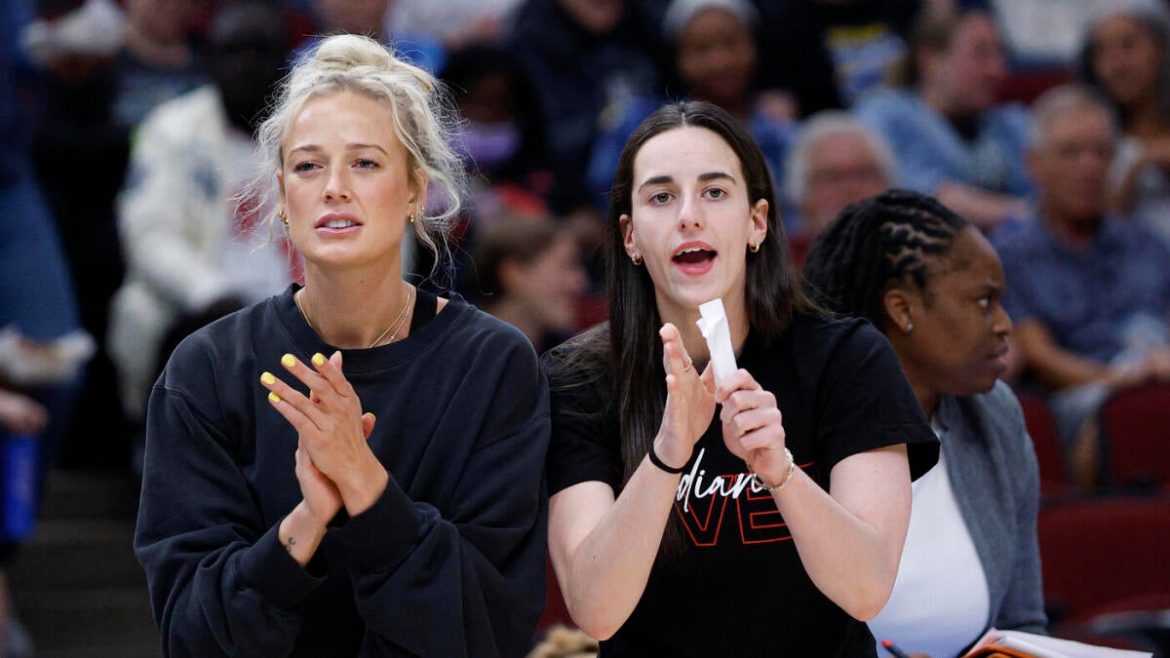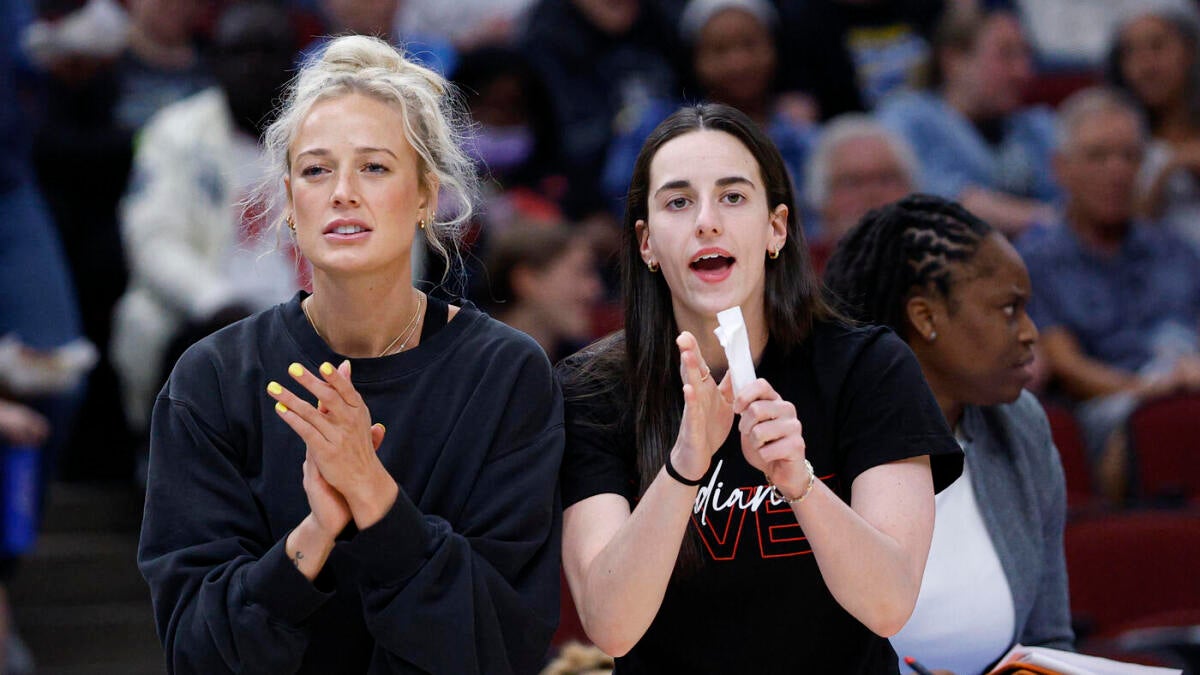The Complex Dynamics of Caitlin Clark’s WNBA Debut and Sophie Cunningham’s Fiery Defense
The WNBA has always been a league of fierce competition, both on and off the court. The arrival of Caitlin Clark, a phenom with a record-breaking college career, has intensified the spotlight on the league, sparking debates about marketability, representation, and the very essence of what it means to be the “face of the WNBA.” Amidst this whirlwind of opinions, Indiana Fever’s Sophie Cunningham has emerged as a vocal and unapologetic defender of her teammate, igniting a conversation that goes beyond mere sports commentary.
The Podcast That Sparked a Firestorm
Sophie Cunningham’s podcast, “Show Me Something,” co-hosted with West Wilson, became the unexpected catalyst for a heated debate. In the inaugural episode, Cunningham didn’t hold back, using blunt and colorful language to dismiss critics who question Caitlin Clark’s right to be considered the face of the WNBA. Her words, described by some as a “verbal nuke,” resonated across the league, sparking conversations and solidifying her role as Clark’s staunch advocate. The podcast episode, intended to showcase Cunningham’s perspective, instead became a lightning rod for discussions about the league’s direction and the challenges of sudden stardom.
The Language of Advocacy: Understanding Cunningham’s Rhetoric
Cunningham’s choice of words—calling Clark’s critics “dumb as f—“—was undeniably provocative. However, to understand the full context, one must look beyond the language itself. Cunningham’s frustration stems from what she perceives as a disregard for Clark’s impact on the league. She sees the criticism as not only misguided but also disrespectful to the player and the excitement she has generated. The strong language suggests a deeper concern about the motivations behind the criticism, possibly rooted in jealousy, resistance to change, or even prejudice.
By using such inflammatory language, Cunningham aims to challenge the core assumptions driving the debate. Her words are a call to action, urging people to reconsider their biases and recognize Clark’s contributions. However, this approach also carries risks. The bluntness of her language could alienate some fans and fellow players, potentially creating tension within the league. Yet, Cunningham’s willingness to speak her mind demonstrates a commitment to her teammate and a passion for the WNBA that resonates with many fans.
Caitlin Clark: A Cultural Phenomenon and a Lightning Rod
Caitlin Clark’s transition from college superstar to WNBA rookie has been nothing short of a cultural phenomenon. Her record-breaking college career, marked by dazzling offensive displays and a flair for the dramatic, created a groundswell of anticipation for her professional debut. This anticipation translated into increased ticket sales, television ratings, and overall visibility for the WNBA. However, with this sudden surge in attention comes scrutiny, both on and off the court.
Veteran players have spoken about the increased pressure and the challenges of adjusting to the spotlight. Clark’s every move is analyzed, and her performance is often compared to her college exploits. This scrutiny has created a complex dynamic within the league, where discussions about Clark sometimes overshadow the accomplishments of other talented players. The debate about whether Clark is the “face of the WNBA” is not just about her individual performance but also about the league’s identity and its future direction.
The “Face of the WNBA”: A Title Under Scrutiny
The concept of a singular “face of the WNBA” is itself a subject of debate. Some argue that the league is too diverse and multifaceted to be represented by one individual. They point to the accomplishments of veteran players like Diana Taurasi, Candace Parker, and Nneka Ogwumike, all of whom have made significant contributions to the league’s growth and popularity. These players have built their legacies over years of dedication and excellence, and the idea of a newcomer like Clark overshadowing their achievements is a contentious one.
Others argue that a recognizable “face” is essential for marketing and promoting the WNBA to a wider audience. They believe that a player with exceptional talent, charisma, and marketability can serve as a powerful ambassador for the league, attracting new fans and sponsors. Caitlin Clark undoubtedly possesses these qualities, making her a compelling candidate for this role. However, the debate highlights the tension between tradition and innovation, between respect for the past and excitement for the future.
Performance and Potential: The Duality of Caitlin Clark
While the hype surrounding Caitlin Clark is undeniable, it’s important to also consider her actual performance on the court. In her rookie season, Clark has shown flashes of brilliance, demonstrating her scoring prowess and playmaking ability. However, she has also faced challenges adjusting to the physicality and pace of the WNBA. Turnovers and defensive lapses have been areas of concern, highlighting the learning curve that all rookies face.
Despite these challenges, Clark’s potential is undeniable. With time and experience, she has the potential to become one of the league’s premier players, leading her team to championships and solidifying her status as a true icon of the game. Sophie Cunningham’s defense of Clark is, in part, a bet on this potential, an investment in the future success of her teammate and the WNBA as a whole. Cunningham’s unwavering support reflects a belief in Clark’s ability to overcome current challenges and emerge as a dominant force in the league.
The Price of Advocacy: Repercussions and Resonance
Cunningham’s strong words, while impactful, also carry potential repercussions. Her blunt language could alienate some fans and even fellow players who disagree with her assessment. Furthermore, her outspokenness could be perceived as disrespectful or unprofessional, potentially leading to tension within the league. However, Cunningham’s willingness to speak her mind also demonstrates a commitment to her teammate and a passion for the WNBA. She is willing to risk criticism and controversy in order to defend what she believes in, a quality that resonates with many fans who admire her authenticity and unwavering support for Clark.
The debate surrounding Caitlin Clark’s status as the “face of the WNBA” is likely to continue for the foreseeable future. As she continues to develop her game and make her mark on the league, her supporters and detractors will continue to offer their opinions. Sophie Cunningham’s bold stance has injected a new level of intensity into this debate, forcing people to confront their own biases and assumptions. Ultimately, the true measure of Clark’s impact will be determined by her performance on the court and her contributions to the growth of the WNBA.
The Echo: More Than Just a Soundbite
Sophie Cunningham’s impassioned defense of Caitlin Clark is more than just a soundbite. It’s a reflection of the complex dynamics within the WNBA, the challenges of navigating sudden fame, and the enduring power of teamwork and advocacy. Her words serve as a reminder that the “face of the WNBA” is not simply a title, but a symbol of the league’s aspirations, its struggles, and its unwavering pursuit of excellence. Only time will tell if Caitlin Clark truly embodies that symbol, but with teammates like Sophie Cunningham in her corner, she certainly has a powerful voice amplifying her journey. The debate may continue, but one thing is clear: Caitlin Clark has already changed the WNBA, and Sophie Cunningham’s advocacy ensures that her impact will be heard loud and clear.





